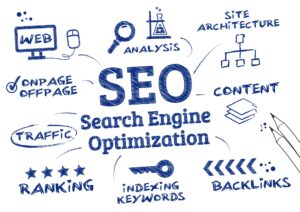Search Engine Optimization Defined
Search engine optimization is the process of improving the visibility and ranking of a website or page on a search engine results page (SERP). It’s a broad term that includes a number of different techniques.
(Looking for “on page off-page technical SEO“? Contact us Today!)

Crawling: Google’s crawlers constantly scan the web, gathering and storing information about all the pages it can find. It does this through a complex algorithm that takes into account a variety of criteria. These factors include how relevant the content is to a particular query, the website it belongs to, and more.
Indexing: Once Google has gathered and categorized all the content it can find, it stores that data in a massive database called the Google Index. This huge database contains billions of pages and helps Google serve up results that are both relevant and helpful to people’s search queries.
Serving results: Finally, Google uses its crawlers to serve up the search results based on the search queries that are entered into its search engine. These search results are categorized into topics, a set of categories that Google has created to help it understand the type of content on different websites.
Topical relevance: Google determines a page’s topic by looking at its keywords, analyzing the page’s context, and identifying how relevant it is to the user’s search query. It also considers how relevant the page is to other pages on the same subject.
Inbound links: Another important factor that Google considers is the number and quality of inbound links to a page. These links tell Google that the page is authoritative, useful, and trustworthy.
Domain: Lastly, Google considers the domain of the page it’s serving up in the SERP to be an important factor in the rankings. It also considers the domain of other pages that link to a page in the same way, and how many of those other pages have high PageRank.
Keywords: Having the right keywords is a critical part of the SEO process. These keywords are the terms that your ideal website visitors are likely to use to search for you online.
Meta descriptions: These are the text descriptions that appear below your website’s title tag on a search engine result page (SERP). They tell Google what a page is about, and they’re also used to indicate value for users.
Backlinks: Having more backlinks to your site can help you rank higher in the SERP. This is because Google recognizes that a website with high-quality, authoritative content has other authoritative sites linking to it.
Technical SEO: Having the right website structure, security, and UX is also critical to a strong website. These factors all influence the overall performance of a website on search engines and can be addressed through technical SEO tactics.
Local SEO: Having a strong presence on Google Maps is critical to ranking in the local search results of a SERP. This can be achieved by optimizing your business’s local profile, reviews, and listing.
There are a lot of other elements that can influence your organic traffic trend line, but the most important thing is that you’re offering useful content to your audience. This content should be crafted with your target customers’ needs and interests in mind. It should also be accessible and easy to find.

Recent Comments